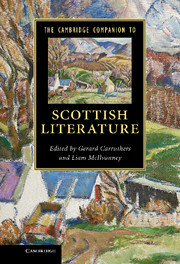Book contents
- Frontmatter
- Contents
- Notes on Contributors
- Acknowledgements
- Chronology
- Introduction
- 1 Scottish Literature before Scottish Literature
- 2 The Medieval Period
- 3 Reformation and Renaissance
- 4 The Aftermath of Union
- 5 Robert Burns
- 6 Enlightenment, Romanticism and the Scottish Canon
- 7 Scott and the Historical Novel
- 8 The Gaelic Tradition
- 9 Scottish Gothic
- 10 Victorian Scottish Literature
- 11 Robert Louis Stevenson
- 12 Hugh MacDiarmid and the Scottish Renaissance
- 13 Popular Fiction
- 14 Muriel Spark
- 15 The Glasgow Novel
- 16 ‘What is the language using us for?’
- 17 The Emergence of Scottish Studies
- 18 Otherworlds
- 19 Scottish Literature in Diaspora
- Index
- References
18 - Otherworlds
Devolution and the Scottish Novel
Published online by Cambridge University Press: 05 January 2013
- Frontmatter
- Contents
- Notes on Contributors
- Acknowledgements
- Chronology
- Introduction
- 1 Scottish Literature before Scottish Literature
- 2 The Medieval Period
- 3 Reformation and Renaissance
- 4 The Aftermath of Union
- 5 Robert Burns
- 6 Enlightenment, Romanticism and the Scottish Canon
- 7 Scott and the Historical Novel
- 8 The Gaelic Tradition
- 9 Scottish Gothic
- 10 Victorian Scottish Literature
- 11 Robert Louis Stevenson
- 12 Hugh MacDiarmid and the Scottish Renaissance
- 13 Popular Fiction
- 14 Muriel Spark
- 15 The Glasgow Novel
- 16 ‘What is the language using us for?’
- 17 The Emergence of Scottish Studies
- 18 Otherworlds
- 19 Scottish Literature in Diaspora
- Index
- References
Summary
The central figure in Allan Massie’s One Night in Winter (1984) is Fraser Donnelly, putative leader of a Scottish Nationalist movement which he claims will bring about ‘a real revolution, a revolution of consciousness, a revolution of morals’, one that will allow Scots to escape ‘the auld Scotland of kirk and kailyard’ and produce a country ‘that’s free and rich too’ (43). What Donnelly actually surrounds himself with, however, is not a modern political machine but ‘a Court’ (124), as full of intrigue and sexual corruption as any in Renaissance Italy. That archaic social structure is gateway to even more atavistic emotion – ‘sometimes you have to go back in time to make the next leap’ (124), he tells one of his courtiers, Jimmy, who later explains its significance:
As for what he meant by a’ that going back in time, well, he’d been doing an awfy lot of reading – that surprises you, that Fraser’s a great reader, it shouldna – about old religions, the Ancient Greek Mysteries, and he’d got haud of the notion that they offered the sort of transcendental experience you needed for real sexual liberation. (125)
In Fraser Donnelly, nationalism is figured as a return to paganism, as an invitation to the dark gods of the primitive to erupt again into the modern world. This Fraser re-enacts the return to the past that J. G. Frazer had undertaken in The Golden Bough at the beginning of the twentieth century:
It was impossible not to feel that Fraser had given them something of profound reminiscent appeal; that the Buick had carried them like a chariot across the gulfs of history, back to the dawn, to a time when the bonding of flesh and spirit was natural to man, before sense was dulled by moral convention, to a time when the primal moving forces of the world acted directly on tingling nerves. (126–7)
- Type
- Chapter
- Information
- The Cambridge Companion to Scottish Literature , pp. 261 - 274Publisher: Cambridge University PressPrint publication year: 2012
References
- 1
- Cited by



